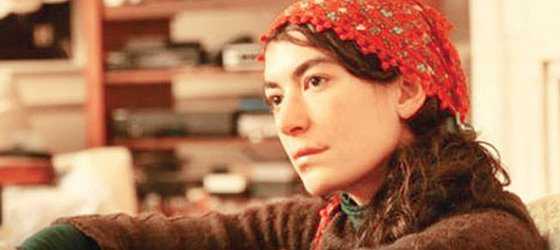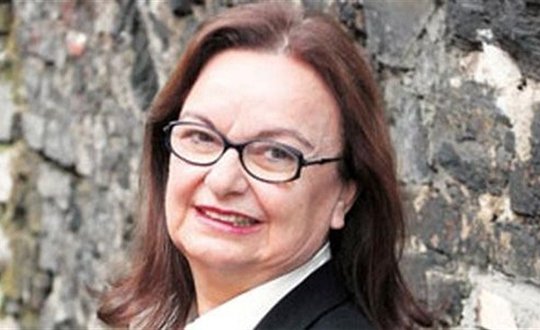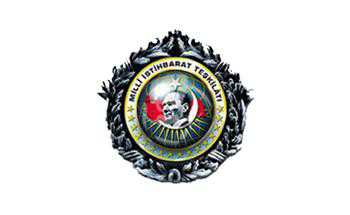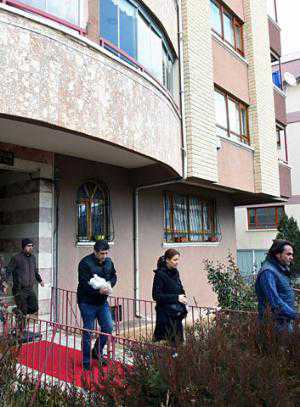In recent times, Turkey has begun to hear about the Kurdish Communities Union (KCK) more and more frequently.
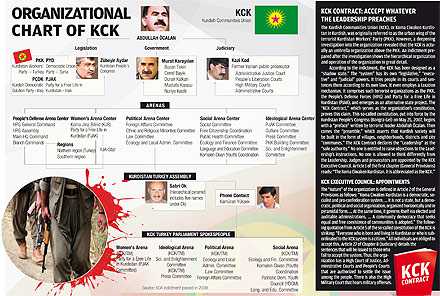
The structure that these three letters describe, however, is not sufficiently understood. The KCK has been placed in the same basket as the terrorist Kurdistan Workers’ Party (PKK), due to its relations with the terrorist group. But the two are actually different. “Koma Ciwaken Kürdistan,” the KCK, is not, in fact, as the press says, “the urban extension of the PKK.” On the contrary, the PKK is just a piece of the overarching KCK, a fragment of the whole.
Turkey first began to hear about the KCK when the April 14, 2009 operation took place. On the orders of the Diyarbakır public prosecutor, a few people were arrested. At later dates, the operations continued. A list of allegations prepared by the prosecutor regarding the KCK was accepted by Diyarbakır’s 6th Criminal Court on June 18, 2010. The 7,578-page list of allegations explains the general structure of the KCK, as has been revealed from documents obtained by authorities.
The essence of what these documents reveal about the KCK is thus: The so-called legislative parliament of the Kongra-Gel terrorist organization on May 17, 2005 formed the “shadow state” of the KCK. Kongra-Gel then accepted the KCK contract as its constitution, and let the public know that it had done so. The new structure, with its own legislative, executive and judicial organs, was defined as a “confederate system.” The KCK possesses both a lateral and a pyramid organizational structure, and is active not only in Turkey but also in Syria, Iran and Iraq.
By forming an alternative to the official organs of justice, management and politics in these countries, it provides a roof under which its supporters can gather.
Abdullah Öcalan is the leader at the helm of the KCK, while the so-called legislative organ, Kongra-Gel, is headed up by Zübeyir Aydar, and Murat Karayılan leads the so-called “executive council.” Karayılan’s assistants are Duran Kalkan, Mustafa Karasu and Cemil Bayık. The armed terrorist units known as the “people’s defense powers” are autonomous organizations within the KCK. As for the PKK, in the KCK’s “constitution” it is defined as the “ideological power behind the KCK system,” responsible for bringing into practice its philosophy of leadership and its ideology. The top-ranked leaders of the terrorist PKK also comprise the KCK’s leadership cadre.
The KCK bestows and revokes citizenship, imposes tax obligations, tries people in courts, engages in armed battle, has both local and central units, makes an effort to control regional leadership and in every way puts Öcalan forward as the leader of Kurdish society, irrespective of the desires of the people. The KCK –which has spread out to cities, towns, neighborhoods, streets, village organizations, communes and homes — uses a flag with a red star on a yellow sun with 21 rays on a green base. Its justice system includes an executive high court, a people’s free court, and a high electoral board. Crimes that occur in its military arena are addressed by its High Military Court.
The founder and leader of the KCK is PKK leader Öcalan. According to the KCK’s “constitution,” Öcalan is the philosophical, theoretical and strategic doctrinarian of a democracy based on ecological awareness and equality of the sexes. He represents the people in every arena, and is the foundation of the leadership. He oversees basic policy-making, and gives final decisions on basic matters. He inspects decisions from Kongra-Gel to make sure they are in keeping with the revolutionary profile. He appoints the president of the executive council. All Kurds, no matter what country they live in, must acknowledge fealty to Öcalan.
The goals of this structure are defined as such: “To create a society in Kurdistan based on the principles of radical democracy, that lives according to the essential elements of democratic societal co-federalism, and which is organized democratically, based on equality of the sexes and ecological awareness. To fight against every kind of backwardness in Kurdish society, and to both create and advance individual and societal spiritual and financial development. To see that every faction of society is able to create its own democratic organization, to create regional people’s parliaments based on the policy of ‘equal KCK citizens.’ To bring about a transition from an economy based on profit to a communal economy based on user value and sharing. To fight against any attacks on the leadership of the Democratic Confederation [Öcalan].”
According to the KCK contract, those attached to the KCK system are defined as “citizens” or “countrymen.” People who betray the principles or aims of the KCK can have their citizenship revoked by decision of the “people’s courts.” Every person living in areas under the rule of the KCK is obligated to actively participate in defense actions when there is a state of war. Every KCK citizen is also obliged to pay taxes.
The highest court in the KCK is Kongra-Gel (the Kurdish People’s Parliament). The highest executive organ is the one run by Karayılan from the Kandil Mountains in northern Iraq. This organ coordinates all of the various institutions, units and organizations of the KCK in Turkey, Syria, Iran and Iraq. This unit is responsible for implementing all of the decisions made by the highest leader. It is obliged to submit regular reports about its actions to said leadership. As for Öcalan, he occupies a position which is literally not to be questioned within this structure.
The Turkish section of the KCK is referred to as the “Turkey Parliament.” The organizational scheme for this section is led by one Sabri Ok, known by the codename “Amed.” This structure plans and carries out all of the various activities in provincial capitals. This runs the gamut from mass events such as throwing Molotov cocktails, burning tires and throwing stones to press conferences, rallies, concerts, festivals, marches and sit-ins. Since 2007, it has increased its involvement in civil disobedience events as well. A campaign to gather signatures in support of the statement “I accept Abdullah Öcalan as the representative of my political will,” a mass march which headed for Mudanya under the name “A March towards İmralı,” the “A Democratic and Peaceful Solution to the Kurdish Problem” rally, hunger strikes in protest of cell conditions imposed on Abdullah Öcalan, the violence and “Edi Bese” events that began in March of 2006 in Diyarbakır and spread quickly to other regions; these all followed on one another. There were street protests that occurred all over Turkey, starting in the East and the Southeast.
Following the 1999 capture of Öcalan, the PKK developed a new dialogue. It began trying to spread a Palestinian-style “intifada” movement, known as “Serhildan,” which means “uprising.” Within the framework of civil disobedience, it followed a strategy of increasing tension by bringing security forces face-to-face with the people. More weight was placed on city structures, with the aim to create a paramilitary organization strengthened in its capacity to carry out normal daily obligations in city neighborhoods, to provide all sorts of financial and spiritual help, and to act according to the wishes of the organization. This is a critical matter that calls for sensitive and careful thought. Some experts note that the urban organization’s power has now surpassed that of the organization in the mountains. Diyarbakır Sunday’s Zaman

